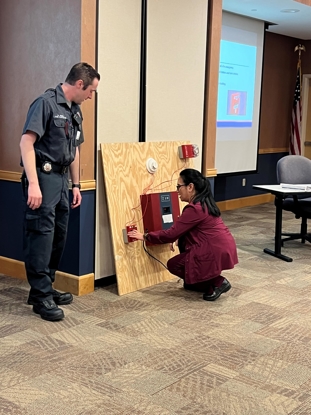Parrish Medical Center Officials Warn Against Delaying Care During Pandemic
- Category: Featured
- Posted On:
- Written By: Parrish Healthcare
Parrish Medical Center Officials Warn Against Delaying Care During Pandemic
Parrish Medical Center (PMC) officials warn against delaying care during the COVID-19 pandemic.
Across the country there are indications that people are foregoing needed treatment, sometimes in emergencies, either because they fear contracting coronavirus or from a desire to free-up emergency department staff to help COVID-19 patients.
People in non-COVID-19 medical distress are placing themselves in danger by delaying seeking care, particularly if they have chronic health conditions such as heart disease, heart failure, diabetes, chronic obstructive pulmonary disease (COPD), and other conditions. They might even forego calling 911, or miss obtaining needed medicines.
The community needs to feel a sense of confidence about the safety of their hospitals and health care providers, said George Mikitarian, president and CEO, Parrish Medical Center | Parrish Healthcare.
“People want to know that hospitals and emergency departments are safe and are taking every precaution to prevent the spread of infectious diseases,”- he said “PMC has earned national and international recognition for its patient safety leadership, and for having an impeccable infection prevention record,” Mikitarian said. “In the war against COVID, we have fortified our arsenal of infection prevention protocols.
For example, he said, one aspect of PMC’s infection prevention track record is particularly relevant during the pandemic.
“We’ve had zero ventilator-associated pneumonia cases in more than 12 years,” he said. “Given the emphasis on ventilator use to treat COVID-19, that’s a critical element in patient outcomes.”
According to an article published by the National Institutes of Health1, “Given the considerable adverse consequences associated with this infection, VAP prevention became a core measure required in most US hospitals.”
The head of PMC’s emergency department said the hospital prepared early for the pandemic, and that people, particularly those with chronic conditions, shouldn’t be hesitant to seek care regardless of the reason.
“Even before COVID-19 became a pandemic, our hospital leadership anticipated what was coming and knew that people would be concerned or frightened about the unknowns concerning COVID-19,” said Michele Fackler, the hospital’s director of emergency and critical care services.
“To ensure patient safety and confidence, leadership said we would put a COVID-19 emphasis on three elements: infection prevention, isolation, and communication.”
Generally, infection prevention requires that people entering the ED, and care partners working there, follow Centers for Disease Control (CDC) guidelines for handwashing, masking, sanitizing the facility, wearing gloves, and more.
Everyone entering the ED is given careful instruction on procedures to keep them safe while in PMC’s care, Fackler said. Patients presenting with any COVID-19-like symptoms (cough, shortness of breath, fever) are isolated from others.
“As always in the ED, life-threatening situations are attended to first,” she said.
Everyone arriving at the hospital ED, on their own, or via EMS, is screened and provided with personal protective equipment (PPE). Facemasks are among the PPE, and ED doctors, nurses, and team are wearing masks at all times.
“Per CDC guidelines, the ED team is wearing complete PPE for any situation in which patients can emit particles into the air, either by coughing, sneezing, or even talking,” Fackler said. “Using the right PPE at the right time helps to ensure that patients and our team are safe.
“From the beginning of the pandemic, our teams have had ample PPE, including N95 masks, and have never had to re-use equipment, which is important to keeping our care partners safe. It’s a testament to the foresight and preplanning efforts of everyone.”
Teamwork with first responders has been a significant asset, she said.
“We’re helped by our great local Emergency Medical Services units, which give us infection surveillance alerts before they arrive with potential COVID-19 patients so we know ahead of time to put those patients in an isolation room,” Fackler said.
PMC communications, internally and externally, have been instrumental in the campaign against COVID-19, she added.
“PMC was the first hospital in Brevard County to have an online COVID-19 risk assessment tool, accessible to everyone,” Fackler said. “That helped people to identify if they were at-risk, and for PMC care navigators to follow up with those who appeared to be at high levels of showing COVID-19 symptoms.”
Fackler said, like everyone else, she hopes there is no second-wave coming of COVID-19. “However,” she said, “If it should happen, we’re ready.”
1 Is Zero Ventilator-Associated Pneumonia Achievable?: Practical Approaches to Ventilator-Associated Pneumonia Prevention. Vazquez Guillamet C1, Kollef MH2. US Library of Medicine, National Institutes of Health



